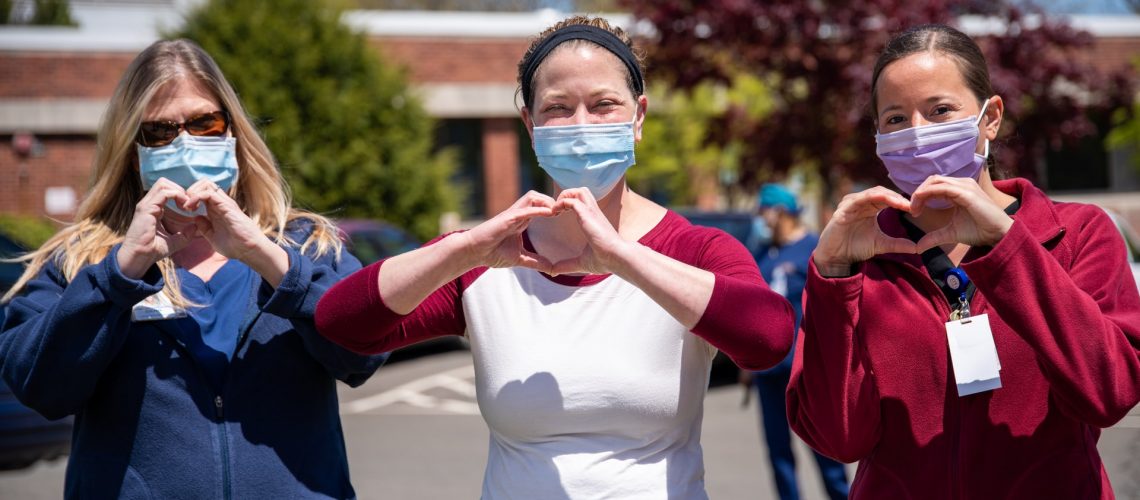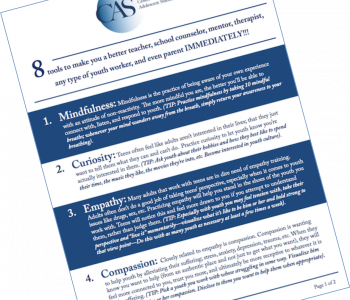

Catharine Hannay, MA
Catharine Hannay is the founder of MindfulTeachers.org and the author of Being You: A Girl’s Guide to Mindfulness, a workbook for teen girls on mindfulness, compassion, and self-acceptance.
6 Ways to Support Overburdened Helpers
“My ability to care for people has suffered. […] Many of us feel like we’re becoming worse at our jobs.”
nurse dealing with hospital staffing shortages during COVID-19 (source: NPR.org)
I doubt there’s a single person working in the helping professions who hasn’t heard that it’s important to practice self-care.
Yes, self-care is important. But it can feel downright insulting to keep hearing ‘you need to take care of yourself’ while simultaneously being expected to do more work than humanly possible.
Simply put, self-care is not enough to mitigate the stressors of working in education, health care, counseling, and social work. Professional helpers need support from their supervisors, peers, families, and communities.
#1: Don’t Say ‘We Do Hard Things’
Unless You’re One of the People Doing Them
As Rollo May points out, excessively optimistic encouragement is
“like putting someone into a canoe and pushing him out into the Atlantic toward England with the cheery comment, ‘The sky’s the limit.’ The canoer is only too aware of the fact that an inescapably real limit is also the bottom of the ocean.”
(The Courage to Create, p. 113)
I recently talked with a teacher whose boss keeps pushing her to group in-person students with online students for pair work and discussions. The teacher is perfectly aware that it would be nice for the students to be able to work with more of their classmates. But she’s also aware that the inevitable tech glitches mean it takes ten minutes longer, per class period, to group students that way than to group the in-person students with each other and the online students with each other.
She doesn’t need encouragement to group the students in a way that’s more challenging. She needs better tech support, and/or for her boss to have a better understanding of the realities of hybrid teaching.
#2: Don’t ‘Help’ by Adding Even More Work
I don’t think supervisors are trying to make it harder for their employees. The problem is that far too often, they ‘help’ by adding even more work. Nine times out of ten, more meetings doesn’t mean more support. It just adds yet another commitment when everybody’s already overwhelmed.
“Teachers say it would help if their district provided additional time to plan or catch up, reduced class sizes, waived some required tasks, or reduced the number of required meetings. But instead, many districts have offered [even more] programming.” (source: Edweek)
And at many institutions, there’s an even greater burden on people of color. In the midst of the pandemic, there’s also been a long-overdue effort to address systemic racism. It’s become very common for white supervisors to expect people of color to lead diversity workshops or write anti-racism statements. They may not be given a choice about whether to take on these added responsibilities, and they usually aren’t offered any additional compensation for the extra work.
“It’s also onerous to educate others about the pain of systemic racial discrimination. […] It amounts to asking a person to relive his or her trauma, time and time again.” (source: BBC)
#3: Take Complaints Seriously
Someone told me the principal at her school was so frustrated after a faculty meeting that he left a block of cheese in the teachers’ lounge with a note, “Do you want cheese with your whine?” (Some of the teachers were so hungry they ignored the sarcasm and ate the cheese!)
The principal didn’t realize that seemingly petty complaints are often a sign of deeper issues. “Often it is a collection of irritants at work that make people feel undervalued, disregarded, and eventually burnt out.” For example, it’s common for medical staff to get frustrated when the photocopier breaks down yet again. While that may not seem like such a big deal, it taps into
“a simmering rage [about] the byzantine paperwork and insurance forms that suck up their after-hours and weekends […]
Having to hunt down a copier that isn’t out of ink or jammed doesn’t just make the patient backlog worse, it ignites an existing fury within.”
Dr. Christina Maslach, an expert on workplace burnout, has seen
“huge morale boosts just from hospital management buying a new copier. In addition to making the work faster, it gives people the sense they are being listened to, that they’re being taken seriously.” (source: NPR)
The new photocopier addresses a real need; it isn’t a pat on the head. Some hospitals have given nurses bonuses for all of the additional work and stress during COVID-19, but at the hospital where Theresa Adams works, they were given a pizza party. While the gesture was well-intentioned, it felt like a slap in the face.
“I heard a lot of noise about ‘Well, this is what you signed up for.’ No, I did not sign up for this,” she says of the unparalleled stress brought on by the pandemic. […] ‘I did not sign up for the facility taking advantage of the fact that I have a calling. There is a difference between knowing my calling and knowing my worth.” (source: NPR)
#4: Advocate for People with Less Power
At a local clinic, one of the patients was yelling at the receptionist because of a long wait to be seen by the medical staff. As soon as the medical director heard about this, she came into the waiting room, spoke with the patient who was complaining, and explained the reason for the delay. It only took a couple of minutes of her time, but it made an enormous difference to the staff and to the other patients in the waiting room.
Power doesn’t just come from an official job title. You could have more power than your peers because of your seniority. Or because you’re close to retirement. Or because you’re not the primary breadwinner in your family.
One young woman I know was working a minimum-wage job in the summer between college and graduate school. Their wages didn’t go up when the state minimum wage increased, and they couldn’t take their scheduled breaks because they were so understaffed. She decided to go to bat for her coworkers because she had less to lose. She knew she’d only be there for a couple of months, and she was living with her parents so she wouldn’t lose her housing if she lost her job.
#5: Take Turns Taking Care of Each Other
In the film Paris, Juliette Binoche portrays a social worker named Elise. At a staff meeting, her boss announces to the group that Elise will need to cut back on her work hours. When her fellow social workers ask why, Elise says, “I need more time for myself.”
Her coworkers are understandably outraged. None of the rest of them have time for themselves, and now they’ll have even more work while Elise slacks off.
What they don’t know is that her brother was just diagnosed with a life-threatening medical condition, and Elise will be his primary caregiver. It would help a lot if Elise told her colleagues about this. But it’s an emotionally wrenching situation which she isn’t ready to publicly discuss.
Her co-workers should assume there’s something going on behind the scenes. After all, why would their boss suddenly decide that Elise, and only Elise, deserves “more time for herself” for no apparent reason?
Elise just needs to reduce her hours for a few months, then she can take on her share of the burden again. And it’s likely someone else will need a turn for special treatment before too long.
Every family goes through a crisis at one time or another. When Professor Elaine Pagels was devastated by her 5-year-old’s medical diagnosis, her husband told her:
“‘Everyone’s life has something like this in it.’
Angry, I snapped back, ‘No, not this—not a child with a terminal illness!’
‘No,’ he said. Not this, but something like this.’”
(from Why Religion? A Personal Story, p. 208)
Of course, it’s much easier to take turns being helpers and helpees when only one person is in crisis at a time. It’s much more challenging when the whole workplace or community is in crisis, but there are still ways to look out for one another. For example, a nurse’s aide at an assisted living facility told me how she and her coworkers supported each other on a particularly tough day.
Everyone’s favorite resident had just died, and everyone’s least favorite resident was obnoxiously demanding a lot of attention. So the nursing staff decided to take turns caring for Grumbles, looking in on the other residents, and sitting quietly in Sweetie’s room before his body was taken away.
Each staff member had a chance to grieve, no one felt overburdened, and all the residents got the care they needed.
#6: Take Care of the Helpers in Your Community
Professional helpers have been through month after month after grueling month of caring for others during the pandemic. If you have any extra time or money, there are many ways you could help shoulder a bit of the burden.
However, unless you know the institution and individuals very well, check first rather than making assumptions about what would be most helpful. A lady of my acquaintance was stunned to find out that her donut delivery was greeted with dismay rather than excitement. She didn’t realize that one of the workers was diabetic and the others were trying to lose weight. A healthy treat like fresh fruit would have been much more welcome.
Conclusion
The details are different in every workplace, but nearly everyone in education, healthcare, clergy, counseling, and social work has been overworked, overwhelmed, and underappreciated. I hope these examples help you think about how you can support your coworkers and the other helpers in your communities.
Here are more posts with suggestions for overburdened helping professionals:

